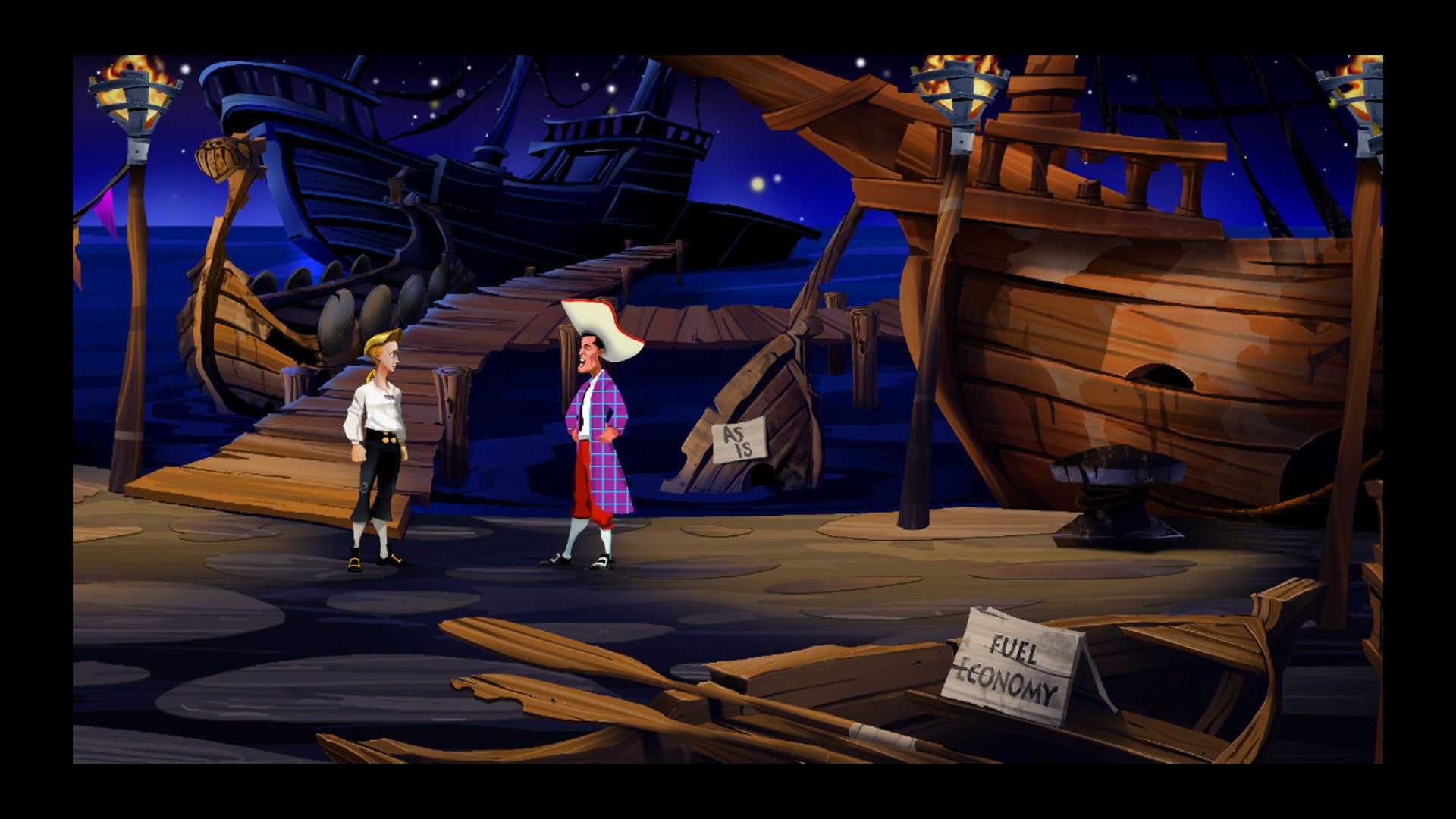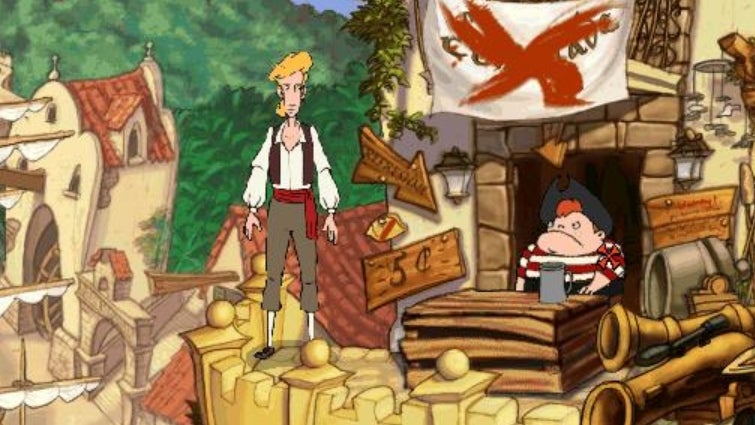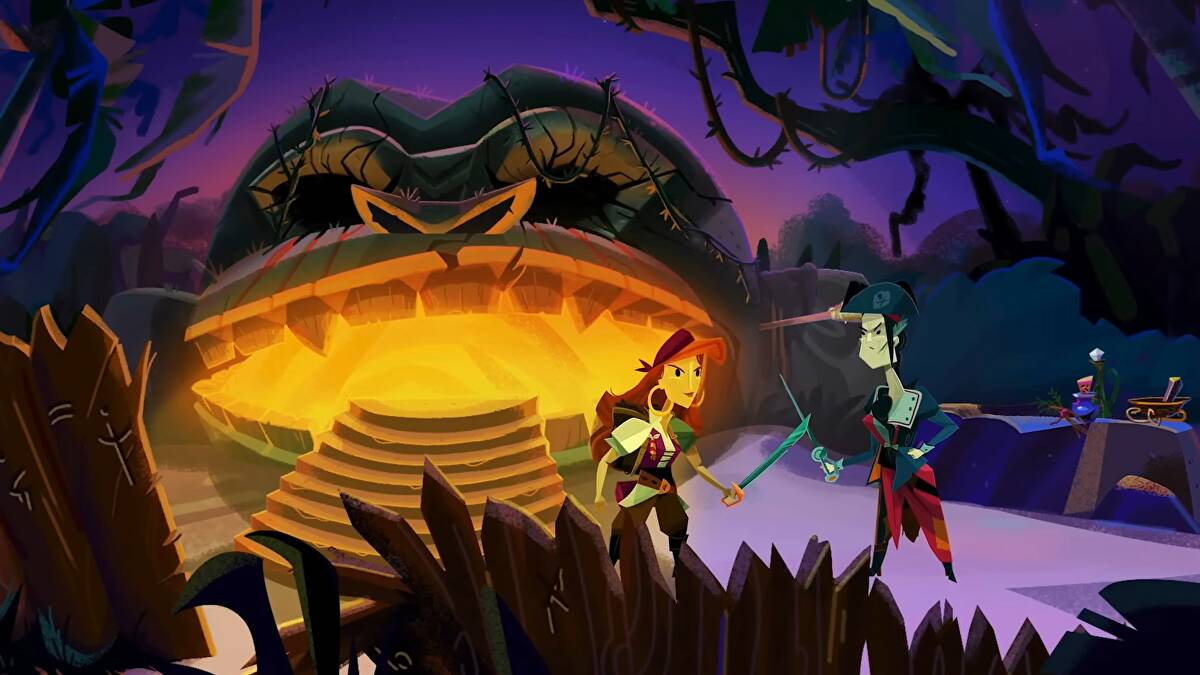Chris Donlan: Years ago when I was at school, a friend of mine had Monkey Island on the family PC. I remember the PC was kept in the hallway, and we used to play for hours and hours into the evening. My memories of Melee Island at night are sort of mingled with the night of my friend’s house as we used to play this thing. I wonder: what are your early memories of Monkey Island? When did you realise it was the thing for you? Victoria Kennedy: It was also a friend for me, or at least one of my brother’s friends. My first memories of Monkey Island are not actually playing it, but seeing other people playing it. I can clearly recall being so entranced by the music (something that to this day still gives me a delighted rush of Dopamine whenever I hear it), and also the colours. To put it simply, it really made me happy. I then went on to play it for myself, and being quite small at the time, it gave me the really great feeling of an epic adventure that I had not ever experienced before. Being older (and perhaps wiser) now, I think another thing that small me enjoyed was that, while it certainly had that sense of adventure to it, there was never the feeling of any real ‘threat’. I could amble along on the island of Melee at a fairly docile pace without feeling any anxiety that something was about to go horribly, horribly wrong. I hope this makes sense! What is it about this series that you think makes it so endearing, and enduring? Chris: I think you nailed it - the colours and atmosphere are such a huge part of why this game feels so transporting. Back in the early 1990s, it seemed incredible that a game could be so rich and evocative and also so funny. I remember the moments where the game broke the fourth wall, and it was always a real shock: games could do this? They could make jokes about being games? But maybe more than anything it’s that sense of place. There’s something really magical to me about being on Melee Island at night - it’s one of the great locations in all of video games. I was always slightly disappointed that you visit Monkey Island itself during the day. Do you have any favourite locations? Victoria: I also loved, and still love, the way the game breaks the fourth wall! Hmm, as for locations, there are some great ones to pick from. From the first game, the Scumm Bar immediately springs to mind! Seeing such playful debauchery (perhaps a strong word, but at the time this is how I remember it feeling) with the pirate hanging off an anchor / chandelier with a grog in hand. That was incredible for me. In subsequent games, Booty Island stands out - perhaps this is because this is where I got to see Elaine Marley again. When I was younger, and many of my friends wanted to be popstars or something like that, I idolised Elaine, along with Sophia from Indiana Jones: Fate of Atlantis and TMNT’s April O’Neil. I also loved the area at the start of LeChuck’s Revenge, where the town is essentially lots of ships. Do you have a particular puzzle that you still remember, for better or for worse? Chris: It’s the structure of puzzles I remember more than the puzzles themselves. I really, really love the Three Trials, because it’s almost an open-world thing. It’s a series of challenges that send you out across Melee Island and the whole island provides the solution. I also love the way that it always subverts your expectations - the easy solutions are never correct. I also loved gathering the ingredients to get to Monkey Island - how about you? Victoria: Insult Swordfighting! “I am rubber, you are glue!” This was comedy gold, and - mirroring my earlier comment - I loved that I could ‘fight’ without there ever being a dire consequence to my actions. I also completely agree with your comment about how the puzzles often subvert your expectations. I only played the third instalment, Curse of Monkey Island, more recently, but there was one puzzle in there where you do a ‘duel’ with a banjo to get a pirate to join Guybrush’s crew. I just love that logic! Are there any puzzles or locations you are hoping we get the chance to revisit in Return to Monkey Island? Chris: I’m playing it now, so I can’t answer that! One thing I will mention is that I thought Curse dealt really well with the nostalgia angle - the desire to relive the experience of the original. If I remember correctly the whole final act is set in a theme park based around the first two games, so you go through these dioramas of the earlier story. It seemed like such a clever, Monkey Islandish way to talk about nostalgia? I love that game, even though I know Ron Gilbert’s very down on it. Did you like the sequels much? Victoria: Curse, yes very much. The final two, not as much to be honest. The large chunk spent inside (can I add spoilers here?) the manatee in Tales felt too… gosh I actually can’t think of a word for this one. But I didn’t especially enjoy that part. I did, however, like the introduction of Morgan LeFlay. What did you think of them? Chris: I played 4 and quite liked it, but I can’t remember the Telltale ones at all. I think LeChuck’s Revenge really holds up, as the weird, spooky middle-act? When you spoke to the developers of Return recently, it seemed that this might not be the last one - would you be happy to see the series go on forever? Victoria: As with everything, if there is a good concept that can be executed well, then yes, keep them coming. However, as much as I love, love this series, I would hate to see it go stale and out stay its welcome. When I spoke to the developers, they mentioned they had discussed a game with Elaine at the fore, and Guybrush as a sidekick. I think that this could be a lot of fun if done with the right team behind it. As I have already mentioned, I love Elaine. Ok, Donlan, lack of night-time visitations aside, which do you believe is the best island - Melee or Monkey? Chris: Definitely Melee. It felt like it gave you an astonishing amount of freedom to explore, and it is just piratey to the max. It’s like a little theme park. It’s probably my favourite video game island, up there with Wind-Waker stuff and The Silent Cartographer. How about you? Victoria: I am in total agreement with you, I love how you describe it like a little theme park. That is precisely it! I also posed this question to Return to Monkey Island’s developers earlier this week. Dave Grossman and Return’s art director Rex Crowle both said Melee as well, but for two different reasons. For Grossman, Melee was easier to write for, thanks to the fact that it was more densely populated than Monkey Island is. In his words: “I think the better island from a writing and storytelling perspective is Melee, because it’s full of people. I learned this on The Secret of Monkey Island when we had all been working on Melee Island and sort of having fun putting together jokes and stuff. And then the time came, we had to start working on the Monkey Island parts. I got shuffled over to do that for a little while, [and] I was like, ‘Wait, this is hard, because there’s all the environments, and I need to make them rich and fun to explore. And then, no people in them’. “[So], you’ll notice there are notes that are left all around on Monkey Island in that first game, and those are there, because you needed somebody to talk to somebody to make things happen. And so just kind of stuck them in. So from that, from that perspective, and that perspective, only, I think Melee Island is better.” I just love the thought process behind those notes, this was something that never crossed my mind before chatting with the Monkey Island team. I am going to look at Monkey Island differently now, and I will smile imagining Grossman trying to flesh out the world for his players without losing any of the game’s whimsy. Meanwhile, Crowle loves the “dark and mysterious atmosphere” of Melee. “[What] I love about it, [is] you just don’t know if, as you’re walking past an alleyway, whether someone’s gonna, like, just jump out and grab you and pull you back there,” he told me. My favourite answer for this one, however, came from Gilbert, who, in a completely deadpan manner, told me he likes the idea of Monkey Island for a holiday, following Grossman’s statement about the lack of people found there.


